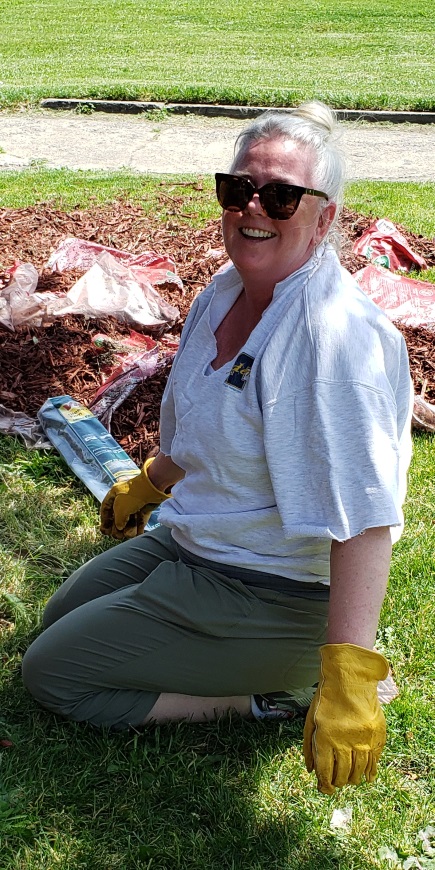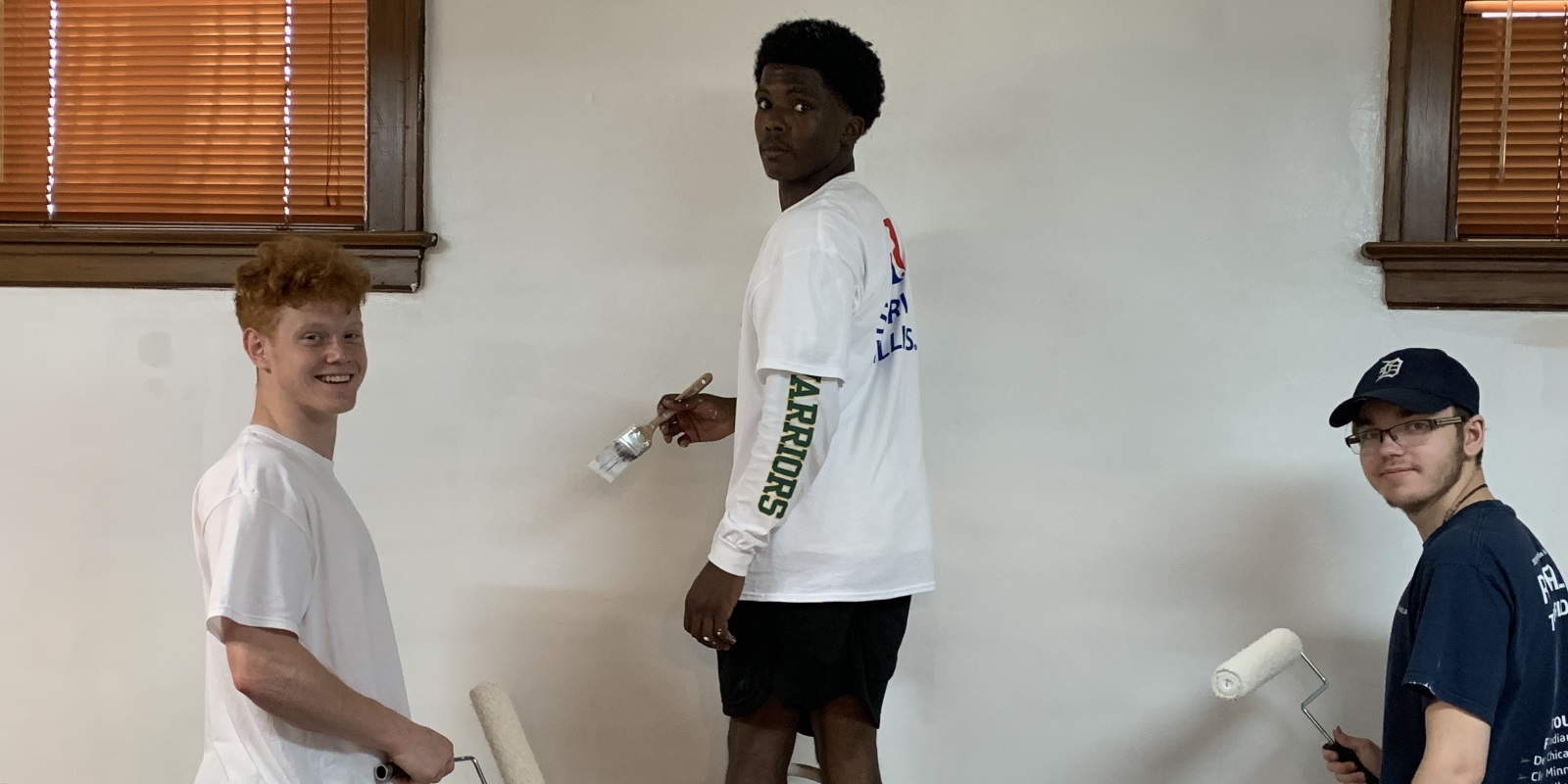Changing the narrative: Social Work faculty member partners with local organization to empower Detroit fathers
It was a warm summer day as the sound of lawnmowers and hedge trimmers filled the air. Carolyn looked over and gazed through the window to see her son laughing as he pushed the paint roller up and down the tired wall. She continued to spread mulch across the flowerbed ahead of her as the image of her husband trimming hedges came into view.

This June day was one of many Wayne State University School of Social Work Associate Professor Carolyn Dayton, PhD has spent at the Family Assistance for Renaissance Men (F.A.R.M.) offices. Having worked with F.A.R.M. for over four years as a program consultant and evaluator, Carolyn has seen this grassroots organization blossom at the helm of founder Willie Bell. Bell and his army of community supporters provide a holistic approach to helping men become better fathers one family at a time.
Carolyn’s work with F.A.R.M. has long been a family affair, with this Wayne State Community Service Day not being the first time her son and husband have come together to support the organization. “My son, while in high school, was an intern with Mr. Bell. He went to court with him to recruit F.A.R.M. participants, attended Saturday recruitment days and assisted around the facility.” It has been a labor of love from the beginning for Carolyn, who has supported the F.A.R.M. mission in a variety of ways including meeting with community members to get the word out, co-writing grants for funding, recruiting participants, mentoring WSU Social Work students placed at F.A.R.M. for their field experience, developing data tracking programs, completing program evaluations, and presenting about FARM at numerous conferences and events. “I believe in the importance of fathers and their place in families and communities. Working with F.A.R.M. and evaluating their programs has provided us with important data on the best ways to support these relationships.”
Before rolling up her sleeves and digging in the dirt of F.A.R.M.’s flowerbeds, Carolyn developed a program evaluation plan across all of the building blocks of the program. Starting with the Principles of Fatherhood, F.A.R.M. emphasizes fathering responsibility, the establishment of a healthy lifestyle and developing a healthy sense of manhood. While observing the Parenting Training and Father-Child Relationship Support intervention, Carolyn learned that many fathers lacked basic parenting skills and were unsure about how to best interact with their children. This experience was heightened when fathers had been estranged from their children for long periods. Coaching to help fathers and children connect in positive ways mitigated these experiences and set the stage for healthy father-child interactions. “We used this information to inform program implementation with subsequent groups. F.A.R.M. now provides fathers with individualized parenting support from social work staff to prepare them to reunite with their children and begin to establish or re-establish positive father-child relationships. This has really made a difference for the participants.” The third building block of F.A.R.M. addresses Co-Parenting Support. Many of the fathers participating in the program have been estranged from the mothers of their children. In order to establish, develop and maintain relationships with their children, it is critical that fathers establish amicable relationships with their childrens’ mother(s). Fathers receive counseling and support from social workers, counselors, ministers and other trained professionals to help build healthy relationships. Workforce Development - Education and Job Skills Training is the fourth arm of the program, which provides education and skill-building to help fathers reach educational goals and achieve their high school diploma, GED or college degree. “Mr. Bell not only works to provide opportunities for Detroit’s fathers, but also helps families and communities. The coolest part is that F.A.R.M. assists men – many of whom would otherwise be incarcerated due to back child support owed – and provides them with job training in pre-skilled trades. F.A.R.M. purchases homes from the Detroit Land Bank Authority and participants learn and practice their plumbing, electrical, carpentry and other pre-skilled trades while rehabbing Detroit homes. Fathers leave the program with new skills and are scooped up by Detroit construction companies.” F.A.R.M. also provides Legal, Child Support and Housing Assistance for hurdles faced by participants to ensure they are able to secure adequate housing for themselves and their children.
As social workers if we are serious about promoting social justice, we have to be a part of the communities we want to support. In my case it’s fathers and fatherhood, so I work alongside all kinds of fatherhood folks in Detroit and do my best to support them. In return I get to hear about the actual issues that fathers in Detroit are facing and then I am better positioned to help address them. In the end, this work is about the kids – when fathers and families and communities are strengthened, the lives of children are improved. - Carolyn Dayton

Community engagement and action are at the heart of Carolyn’s work. After hearing about policy issues that unintentionally functioned to keep fathers away from their children, Carolyn and her colleagues established the Metro Detroit Fatherhood Policy Initiative, which she now co-chairs with Bomani Gray from the Detroit Health Department. The Initiative provides a space for individuals from across the city, county, and state to learn what’s working and not working in Michigan’s fatherhood program space. This group provided testimony to the Governor’s Task Force on Jails and Pre-Trial Incarceration and created a parenting tip sheet designed to support fathers during COVID.
The Covid pandemic created new challenges for leaders in the fatherhood field. “When COVID hit, I learned that fatherhood program leaders and agencies were really struggling to keep the work alive. This was taking a toll on their mental health and it really became an emergency to me in a meeting where one leader broke down after not being able to assist a father who could not find his suicidal son due to the COVID shutdown. The toll it was taking on this fatherhood leader was intense. To help, I created a weekly Zoom meeting for leaders in the fatherhood field to connect, reflect and refuel.”
We have systems of support in place for mothers, we really don’t for fathers. And I think there is a social narrative that these guys don’t care about their kids. They very much do. People assume that mothers have the most influence on their children, but we know from the empirical research that fathers have a huge and often a very different influence on their children than mothers. Programs like F.A.R.M. help us switch these narratives and show that it can happen for these men. - Carolyn Dayton
Learn more about The women behind F.A.R.M. featuring Carolyn Dayton and Social Work students Amani El-Edlebi and Felicia Taylor in a WXYZ-TV Detroit Channel 7 News feature. If you are a fatherhood leader looking to connect with others, reach out to Carolyn Dayton at carolyn.dayton@wayne.edu or access the meeting link.
We also encourage you to visit the F.A.R.M. website to learn about ways you can get involved or to access an application to participate in the program.
Hero image caption: (Back row, from left): WSU football players Brandon Tuck-Hayden, Kendall Williams, Julius Wilkerson, Charles Ellington, Kofe Kimbrell, Jacob Mass, Maxx Fisher, Dalen Peeks; (Front row, from left): F.A.R.M. founder and CEO Willie Bell, WSU Social Work faculty Carolyn Dayton, WSU Athletics learning specialist Maria Sepúlveda, College of Education undergraduate student Dante Michelotto, community member Darci Michelotto;